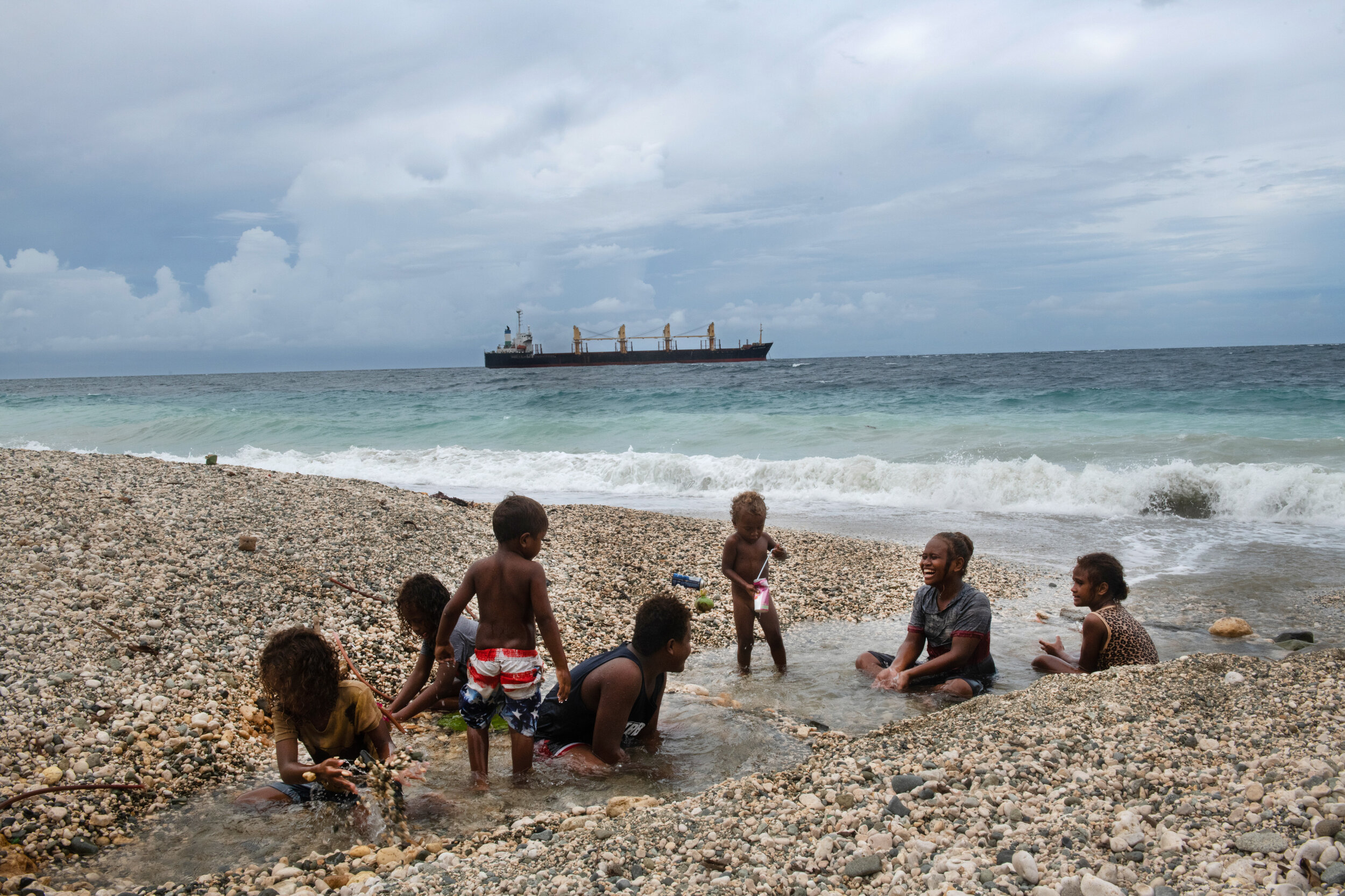
Children play on the beach outside of Honiara, in front of a logging ship waiting to be loaded on September 14th, 2019. Nearby is a logging point, which is at the end of the road and is where logs are loaded onto ships. Thousands of logging points dot the coast of the Solomon Islands and often points are visible from each other. It is often round logs that are exported from the country, occasionally illegally as there is a lack of oversight due to the remote location of the points and government corruption.Primary species of timber exported from Solomon Islands include vitex (Vitex cofassus), akwa (or taun, Pometia pinnata), kwila (or merbau, Instia bijuga) and rosewood (Pterocarpus indicus). It takes 75-80 years for these trees to grow.
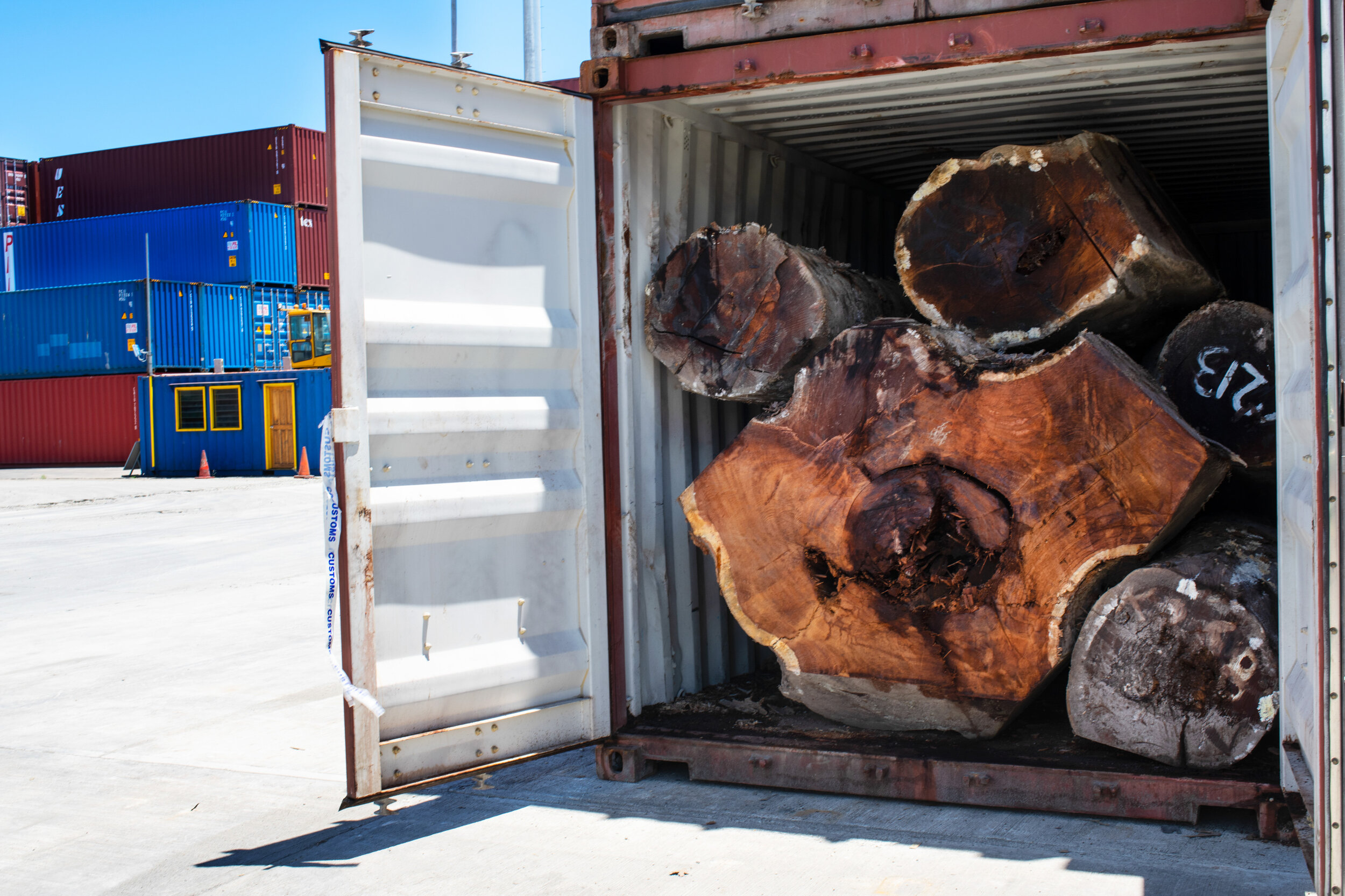
One of Nineteen containers of Kwila that was seized by the Customs Department of the Solomon Islands in the port of Honoria photographed on September 25th, 2019. At the time of photographing Jim Sutton, the head of Customs was waiting for confirmation from the forestry department that it was indeed Kwila, this is necessary to formally seize the items. They were tipped off anonymously and checked the cargo, which was billed as milled Kwila, which has significantly fewer export duties (25%)and less value abroad than round (uncut) Kwila. It takes 75 years for these trees to grow. The Solomon Islands is one of the few countries in the world that allows the export of raw or round logs grown naturally.
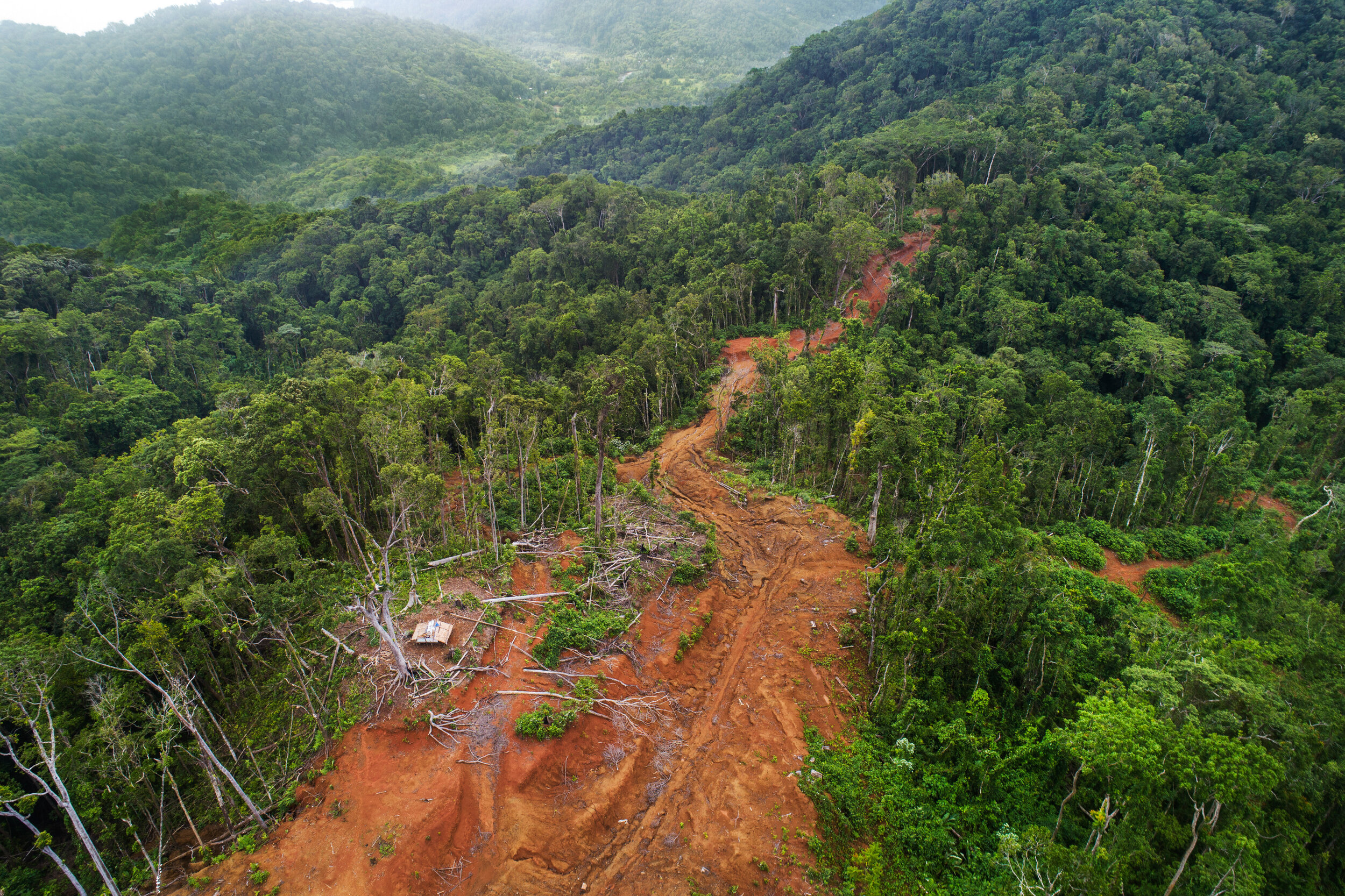
A logging road leads up to the main camp of the Galego company before they were ejected by a group of locals who ejected the company through legal means. Logging roads are one of the many ways the companies are ruining the islands. The Solomon Islands have more than 12,600 kilometers (7,800 miles) of logging roads, which open up sensitive habitats to potential degradation and destruction.The camp is outside the village of Marasa, which is on the other side of Guadalcanal on September 21st, 2019 in the Solomon Islands. Thousands of logging points dot the coast of the Solomon Islands and often points are visible from each other. It is often round logs that are exported from the country, occasionally illegally as there is a lack of oversight due to the remote location of the points and government corruption.
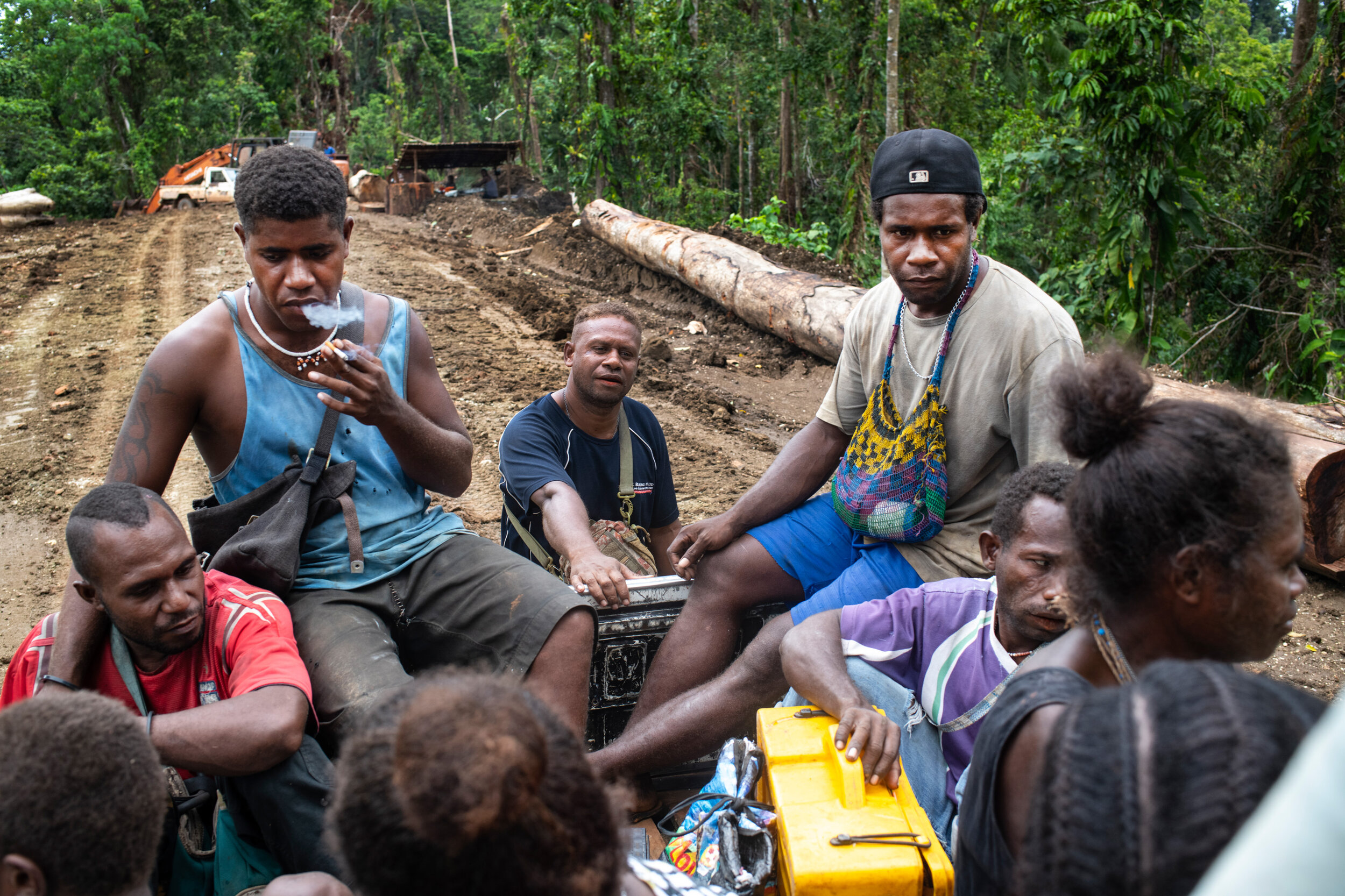
Locals who work for the logging company are transported up the mountain, along with a group of female rangers who police the forest and ensure loggers stay within their allocated lands.They are affiliated with Ma'asina Greenbelt Initiative and they are led by Timothy Kwaitaa and Jessica Jacinta, 29.In the guise of the increasing and unsustainable logging in Solomon islands, community-based organizations in the West Are’are region on Malaita province collaborated together to save their remaining pristine forests. These community-based organizations came up with the Ma’asina Greenbelt Initiative, a conservation initiative that covers tribal forest boundaries of the agreed communities. Currently, the initiative covers about 2 square km. They are looking to expand up to 20sq km in the future.
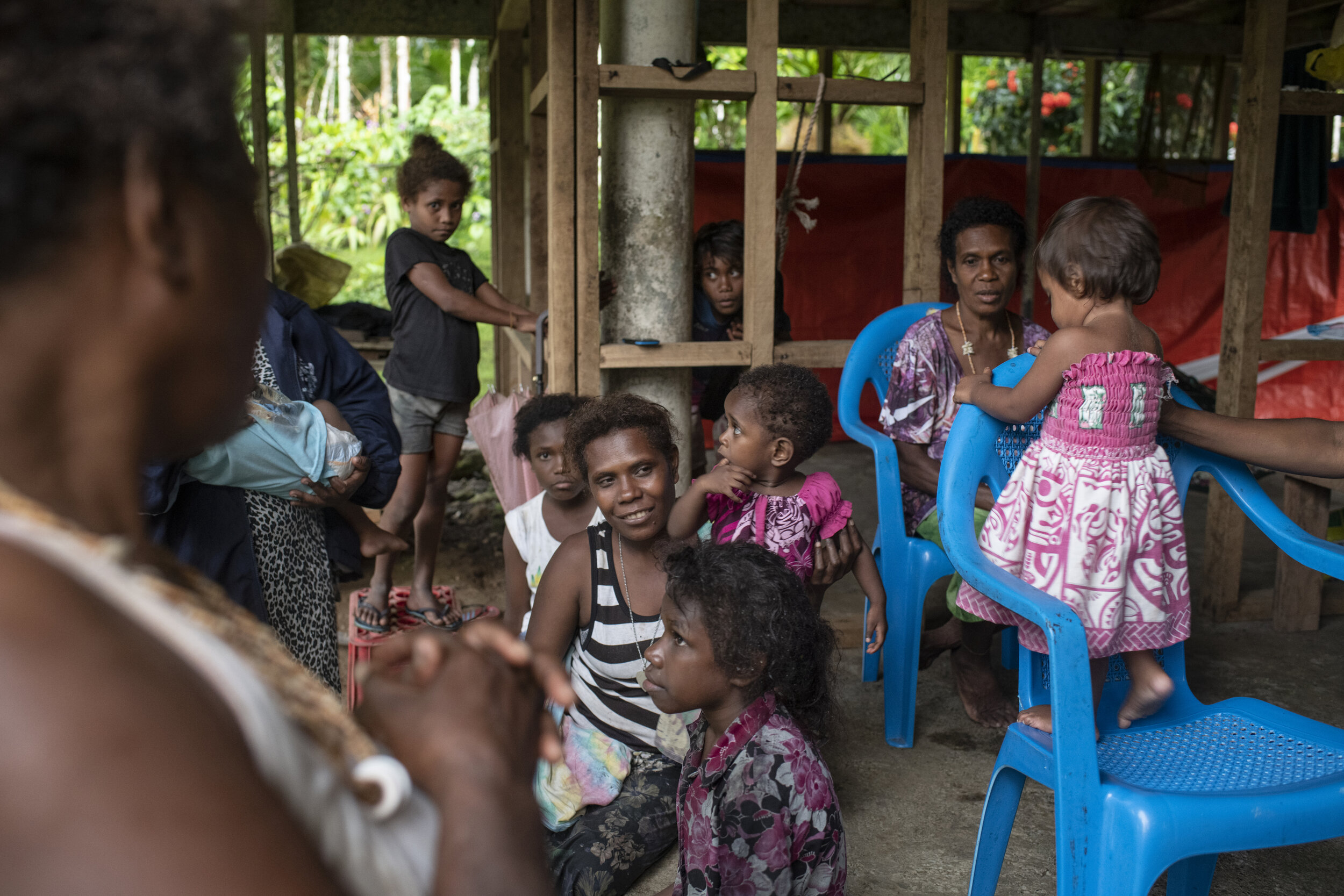
Florence Lagona, 30 and her child listen to the village elders as they recount the story of how they protested the logging companies. Miriam, Esmi and Veronica Lauvota, 88 , villagers of Hebron recount the story of how they stood on the beach and protested the logging company when they first arrived.

Kwila trees in a forest that would have been logged by the Galego company outside the village of Marasa, which is on the other side of Guadalcanal on September 21st, 2019 in the Solomon Islands. The village of Marasa and the other villages in the valley successfully kicked out the Galego logging company, mostly due to Phillip Jr's legal knowledge and experience working with Transparency International. Unfortunately, many villages in the Solomon Islands don't have the experience Phillip has and are victims of the large logging firms. Thousands of logging points dot the coast of the Solomon Islands and often points are visible from each other. It is often round logs that are exported from the country, occasionally illegally as there is a lack of oversight due to the remote location of the points and government corruption.
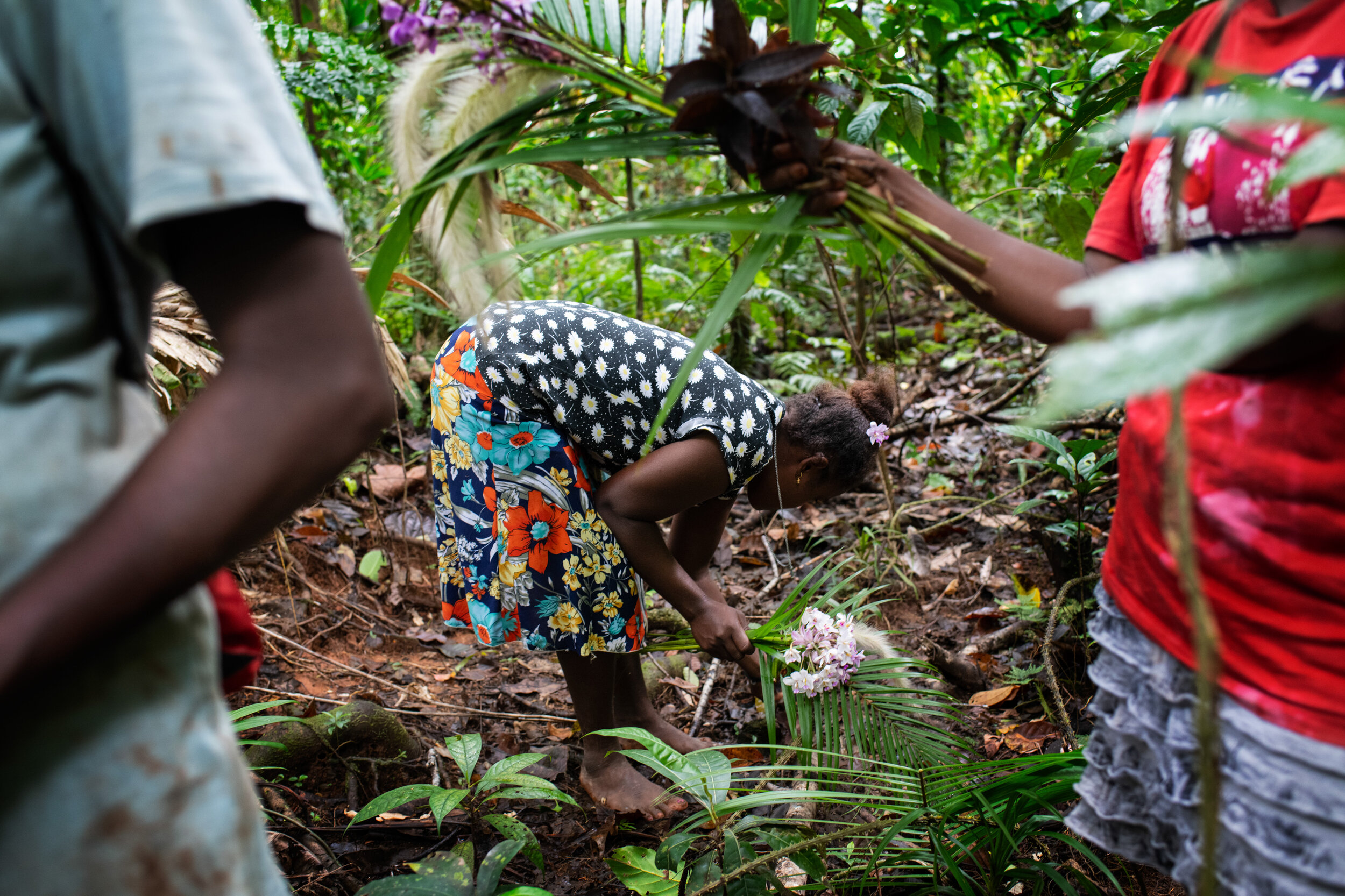
Women from the village of Igwa volunteer to police the Ngu Brothers logging company on September 18th, 2019, owned by Chinese-Malaysian Derrick Ngu, to make sure they only log in the allowed area. Often companies ignore boundaries and pick out the high-value trees as there is little oversight in remote areas.Stella Abulate, 31 and Mary Osirii, 31 collect flowers in the jungle while on patrol. They are part of a group of conservationists photographed on September 18th, 2019. They are affiliated with Ma'asina Greenbelt Initiative and they are led by Timothy Kwaitaa and Jessica Jacinta, 29.In the guise of the increasing and unsustainable logging in Solomon islands, community-based organizations in the West Are’are region on Malaita province collaborated together to save their remaining pristine forests.
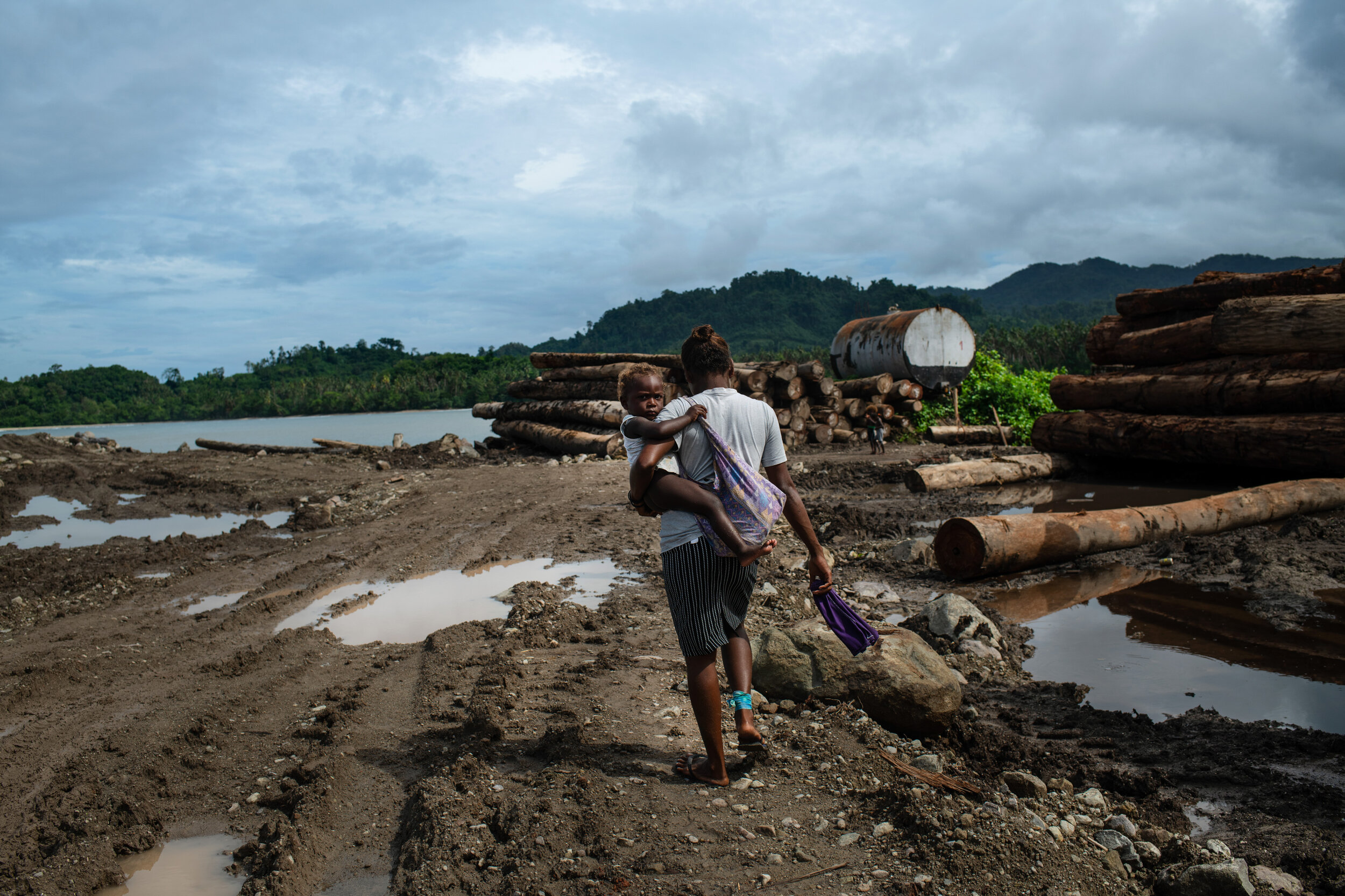
A woman walks through a logging camp used by the Apex company on September 23rd, 2019. These logging points are crucial for moving round logs to ships and out of the country. Because these points are so remote it makes it difficult to police whether logs leaving the country are legal or not. In the guise of the increasing and unsustainable logging in Solomon islands, community-based organizations in the West Are’are region on Malaita province collaborated together to save their remaining pristine forests. These community-based organizations came up with the Ma’asina Greenbelt Initiative, a conservation initiative that covers tribal forest boundaries of the agreed communities. Currently, the initiative covers about 2 square km. They are looking to expand up to 20sq km in the future.
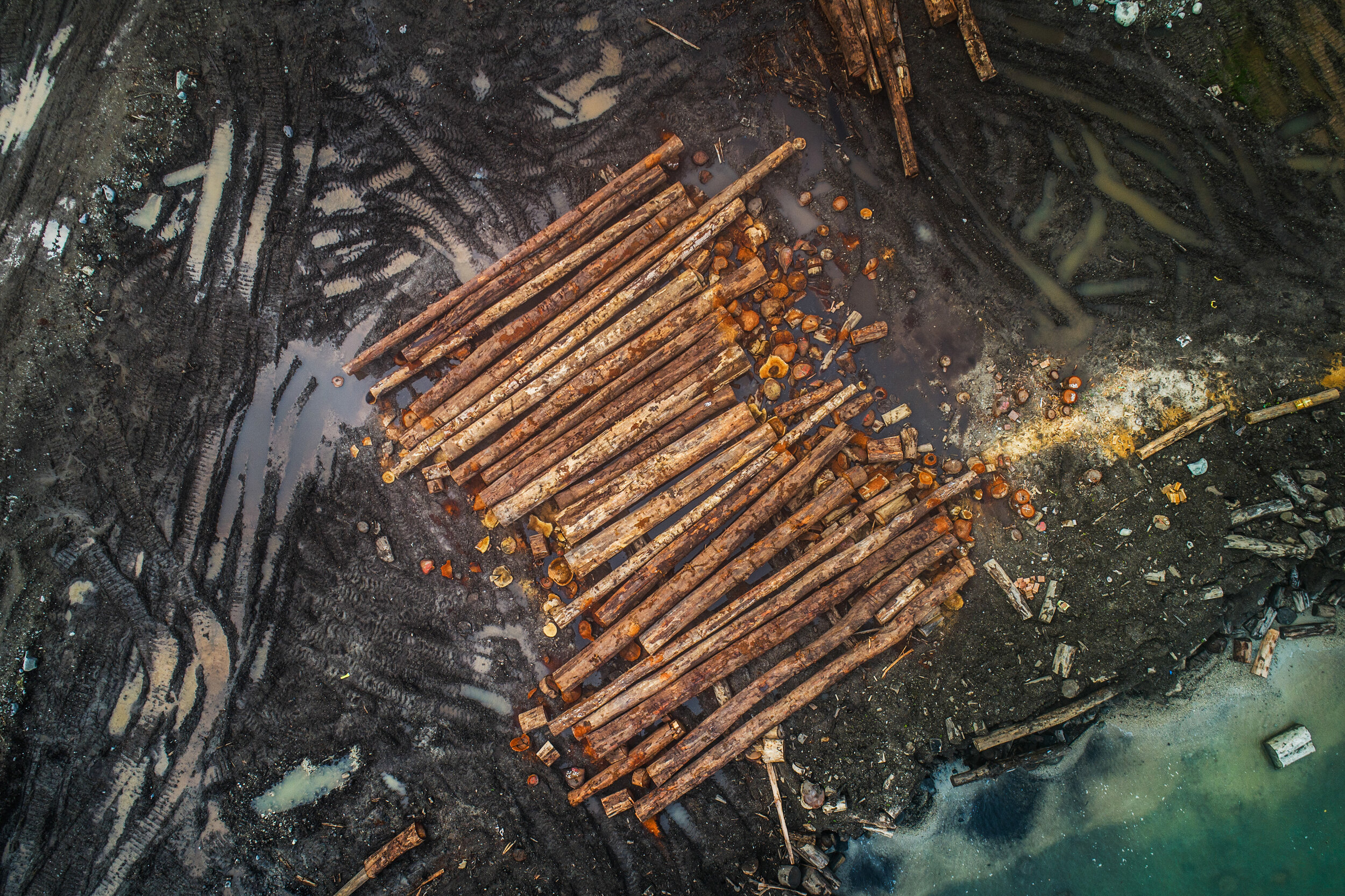
A logging point on the Eastern Tip of Guadalcanal Island used by the Apex company on September 23rd, 2019. These logging points are crucial for moving round logs to ships and out of the country. Because these points are so remote it makes it difficult to police whether logs leaving the country are legal or not. In the guise of the increasing and unsustainable logging in Solomon islands, community-based organizations in the West Are’are region on Malaita province collaborated together to save their remaining pristine forests. These community-based organizations came up with the Ma’asina Greenbelt Initiative, a conservation initiative that covers tribal forest boundaries of the agreed communities. Currently, the initiative covers about 2 square km. They are looking to expand up to 20sq km in the future.
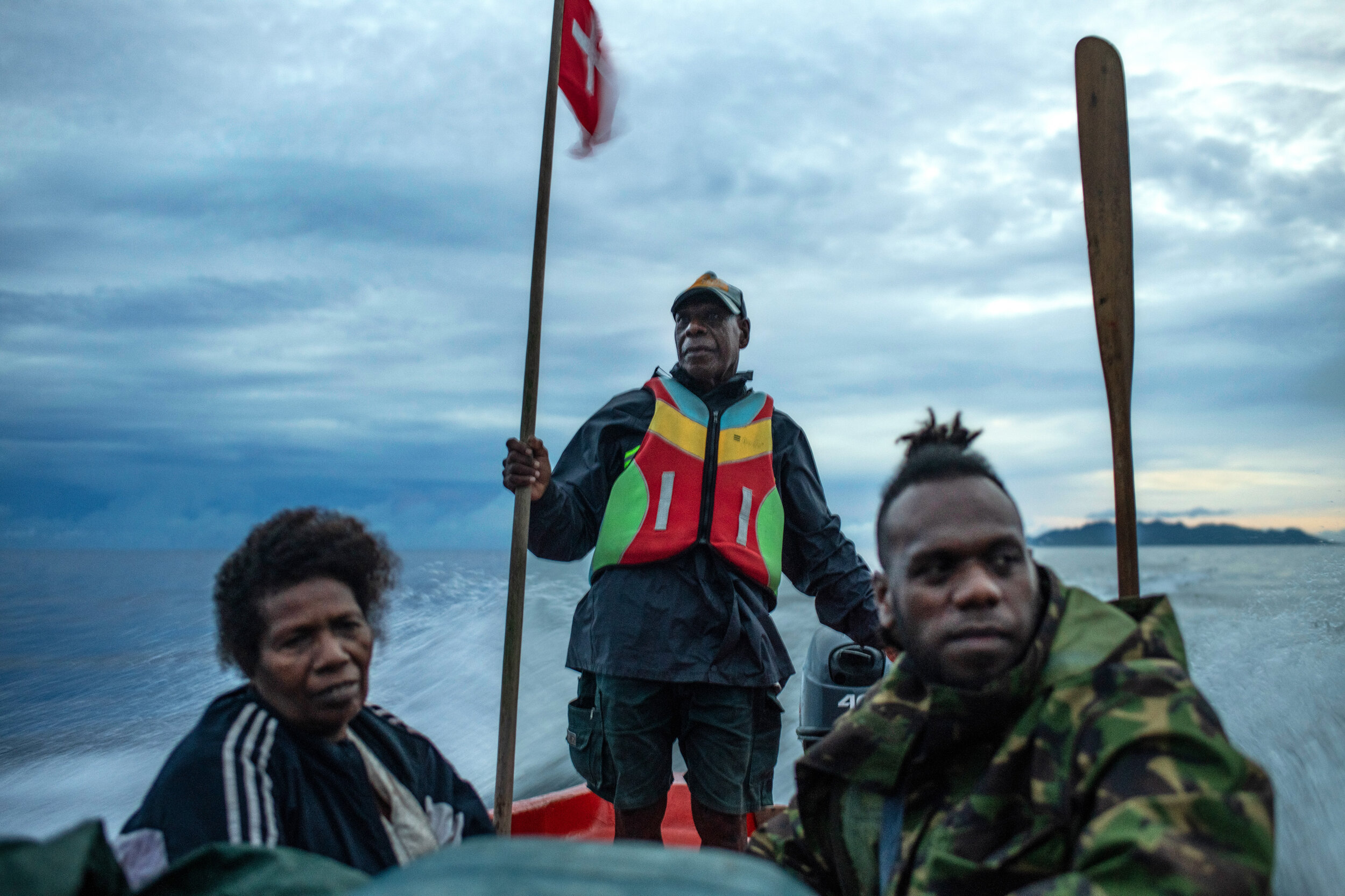
Phillip Manakako Sr. readies his boat to go to the village of Marasa, which is on the other side of Guadalcanal on September 20th, 2019 in the Solomon Islands. Because there are no roads on the island the village is only accessible by boat. The village of Marasa and the other villages in the valley successfully kicked out the Galego logging company, mostly due to Phillip Jr's legal knowledge and experience working with Transparency International. Unfortunately, many villages in the Solomon Islands don't have the experience Phillip has and are victims to the large logging firms. Primary species of timber exported from the Solomon Islands include Vitex, Akwa, Kwila, and Rosewood. It takes 75-80 years for these trees to grow.
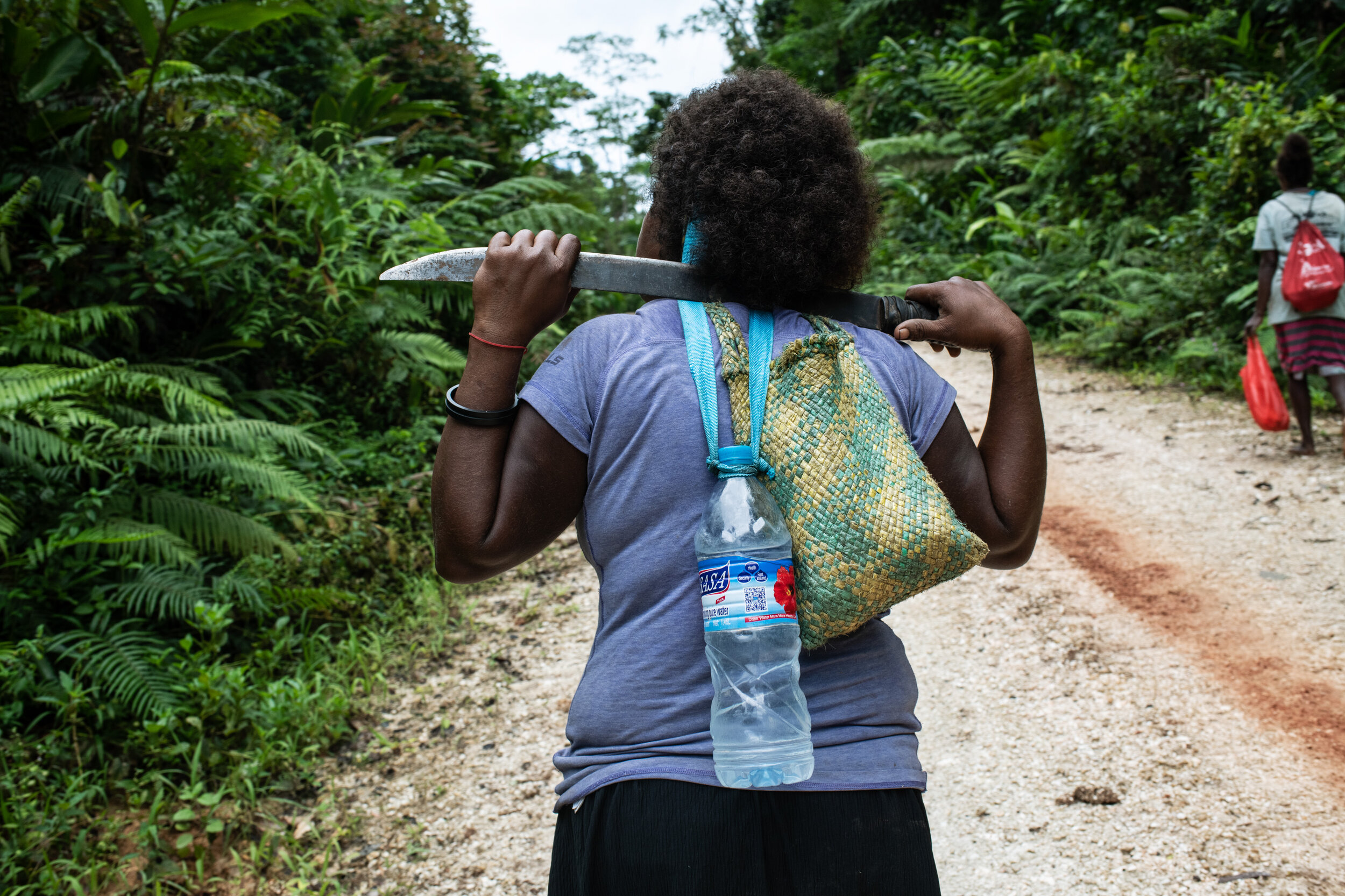
Women from the village of Igwa volunteer to police the Ngu Brothers logging company on September 18th, 2019, owned by Chinese-Malaysian Derrick Ngu, to make sure they only log in the allowed area. Often companies ignore boundaries and pick out the high-value trees as there is little oversight in remote areas.Stella Abulate, 31 and Mary Osirii, 31 collect flowers in the jungle while on patrol. They are part of a group of conservationists photographed on September 18th, 2019. They are affiliated with Ma'asina Greenbelt Initiative and they are led by Timothy Kwaitaa and Jessica Jacinta, 29.In the guise of the increasing and unsustainable logging in Solomon islands, community-based organizations in the West Are’are region on Malaita province collaborated together to save their remaining pristine forests.
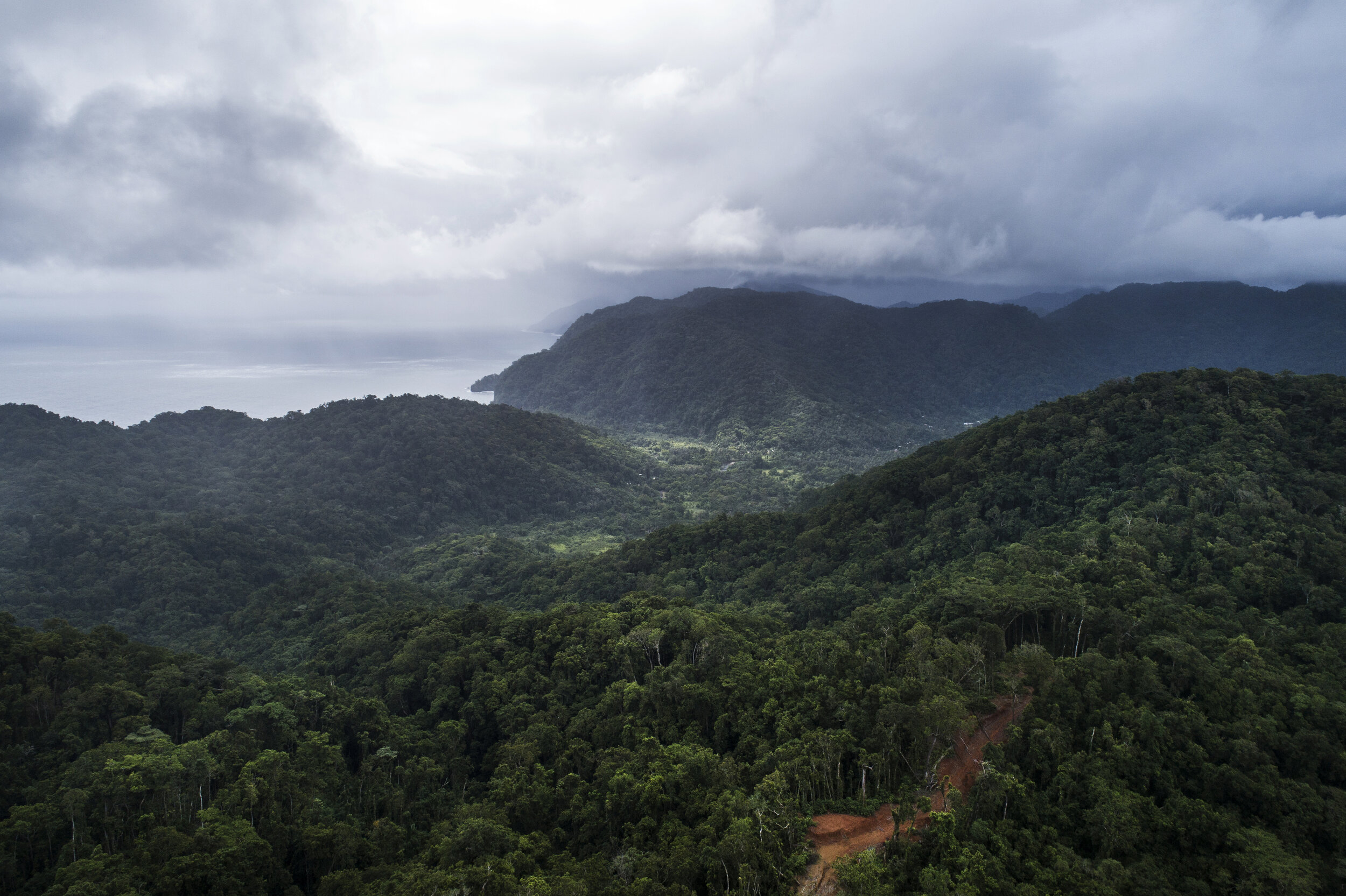
The village of Marasa and surrounding valley can be seen from the former logging camp. A logging road leads up to the main camp of the Galego company before they were ejected by a group of locals who ejected the company through legal means. Logging roads are one of the many ways the companies are ruining the islands.
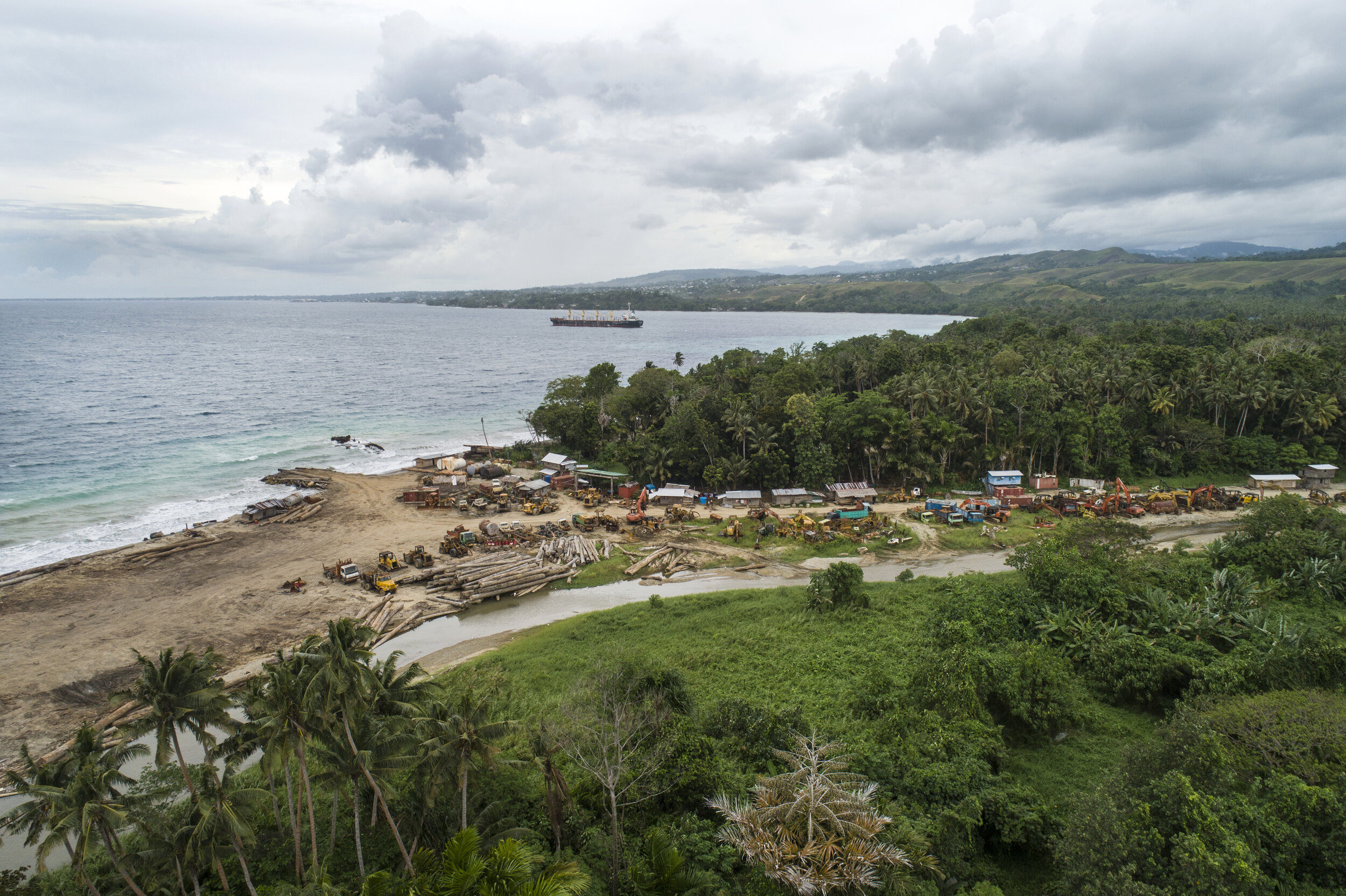
Thousands of logging points dot the coast of the Solomon Islands and often points are visible from each other. It is often round logs that are exported from the country, occasionally illegally as there is a lack of oversight due to the remote location of the points and government corruption.

Florence points out a nest in the jungle. Florence is part of the women from the village of Igwa who volunteer to police the Ngu Brothers logging company on September 18th, 2019, owned by Chinese-Malaysian Derrick Ngu, to make sure they only log in the allowed area. Often companies ignore boundaries and pick out the high-value trees.
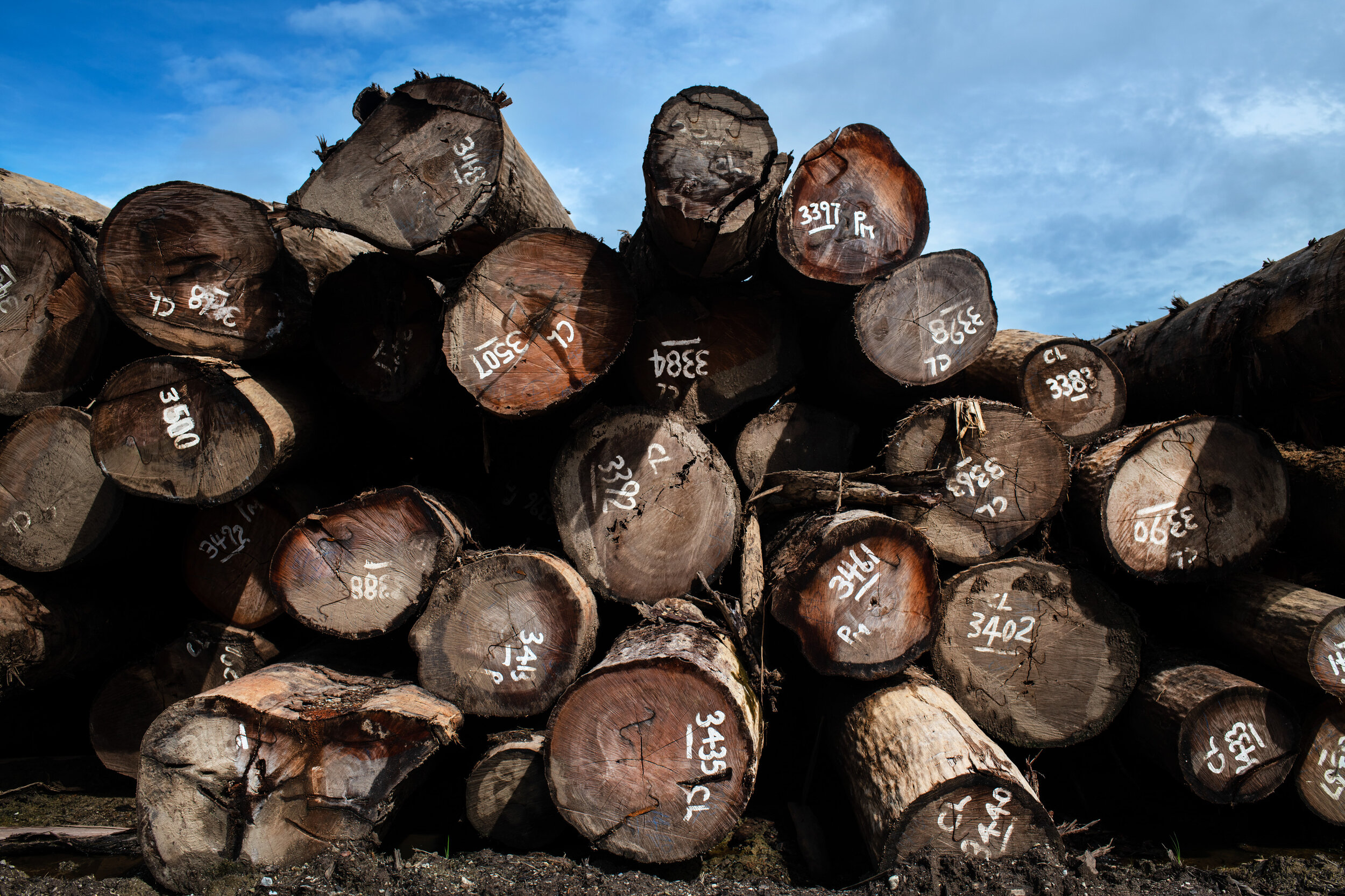
A logging point on the Eastern Tip of Guadalcanal Island used by the Apex company on September 23rd, 2019. These logging points are crucial for moving round logs to ships and out of the country. The point is located at 09°33′54.94″S 159°38′19.74″E and sits on the far side of Guadalcanal island in the Solomon Islands.Because these points are so remote it makes it difficult to police weather logs leaving the country are legal or not. In the guise of the increasing and unsustainable logging in Solomon islands community-based organizations in the West Are’are region on Malaita province collaborated together to save their remaining pristine forests. These community based organizations came up with the Ma’asina Greenbelt Initiative, a conservation initiative that covers tribal forest boundaries of the agreed communities. Currently, the initiative covers about 2 square km. They are looking to expand up to 20sq km in the future.As land is collectively owned in the Solomon Islands, permission is tricky and communites are often torn about weather or not to let the companies in.
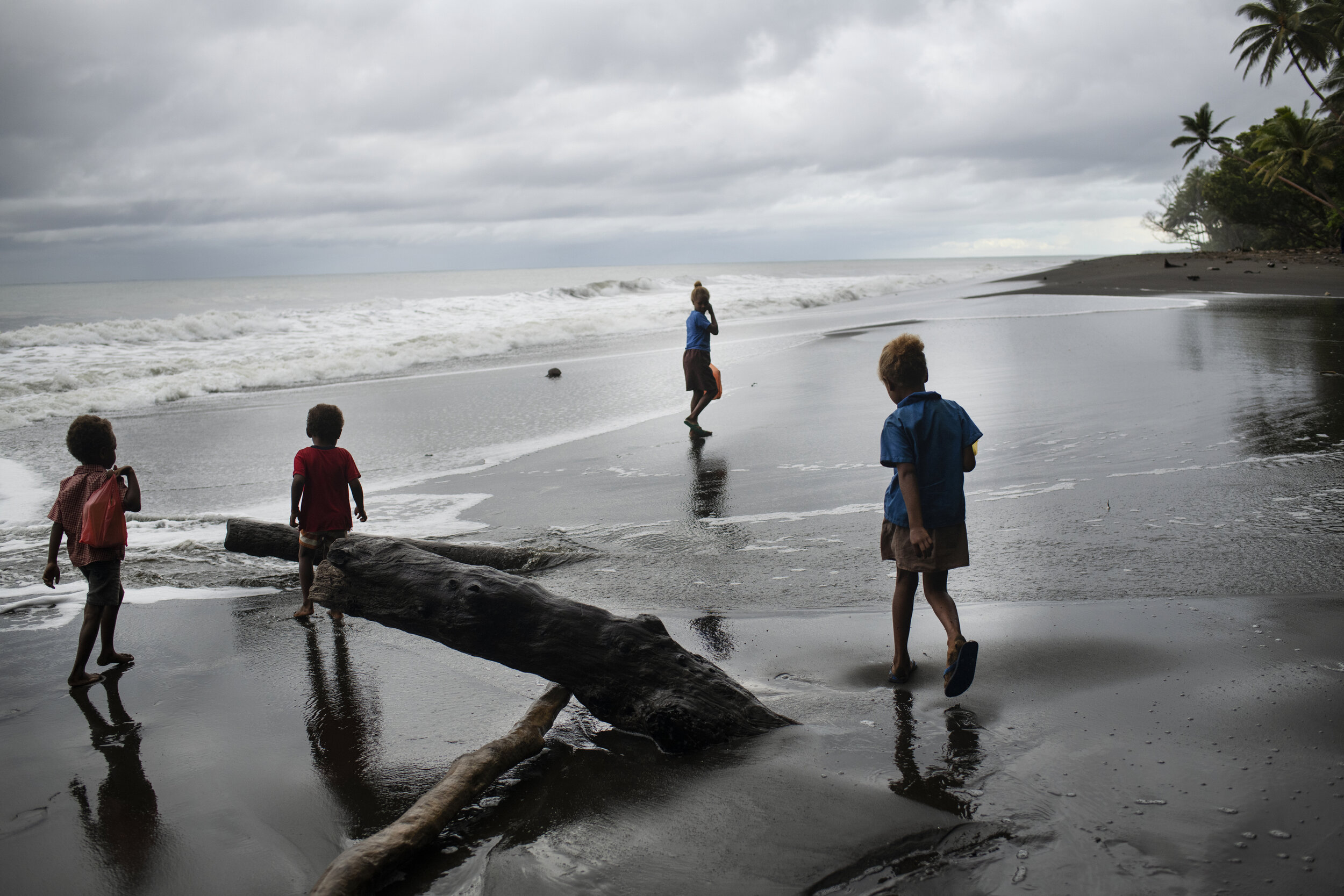
Children living at Wai-hau conservation foundation a Leatherback turtle monitoring and recovery project in the village of Wai-hau go to school in the morning on the island of Malitia in the Solomon Islands on September 18th, 2019. As the village doesn't have a road they walk to a nearby village of Hauhai and are transported from there.
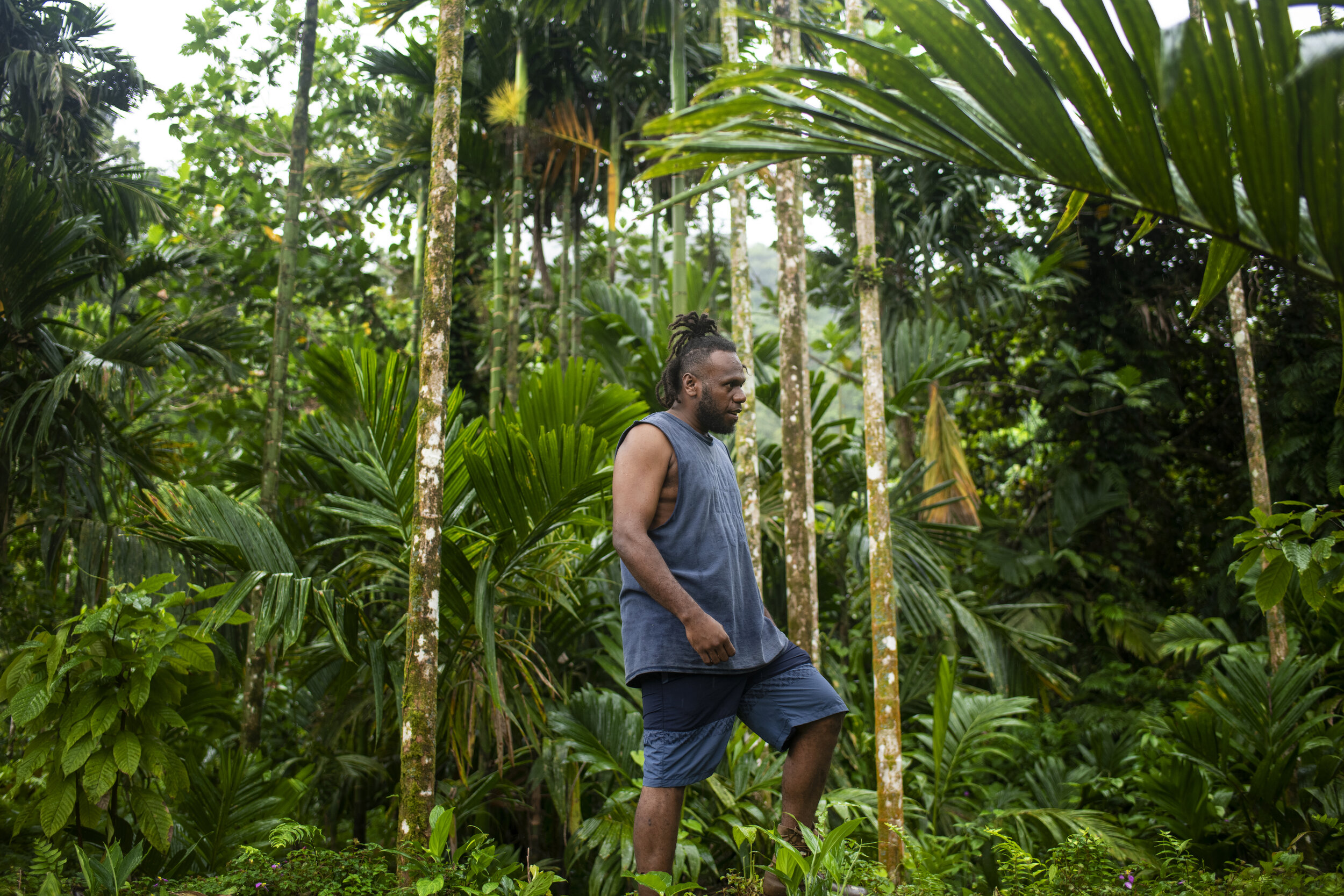
Phillip Jr. in his village of Marasa on September 20th, 2019 in the Solomon Islands. Because there are no roads on the island the village is only accessible by boat.
The village of Marasa and the other villages in the valley successfully kicked out the Galego logging company, mostly due to Phillip Jr's legal knowledge and experience.

The MV Tamarinho leaves the Honiara port on September 27th, 2019 bound for Auki, the main city of Malaita in the Solomon Islands. As flights are expensive, citizens of the Solomon Islands rely on boats for transportation.


















Children play on the beach outside of Honiara, in front of a logging ship waiting to be loaded on September 14th, 2019. Nearby is a logging point, which is at the end of the road and is where logs are loaded onto ships. Thousands of logging points dot the coast of the Solomon Islands and often points are visible from each other. It is often round logs that are exported from the country, occasionally illegally as there is a lack of oversight due to the remote location of the points and government corruption.Primary species of timber exported from Solomon Islands include vitex (Vitex cofassus), akwa (or taun, Pometia pinnata), kwila (or merbau, Instia bijuga) and rosewood (Pterocarpus indicus). It takes 75-80 years for these trees to grow.
One of Nineteen containers of Kwila that was seized by the Customs Department of the Solomon Islands in the port of Honoria photographed on September 25th, 2019. At the time of photographing Jim Sutton, the head of Customs was waiting for confirmation from the forestry department that it was indeed Kwila, this is necessary to formally seize the items. They were tipped off anonymously and checked the cargo, which was billed as milled Kwila, which has significantly fewer export duties (25%)and less value abroad than round (uncut) Kwila. It takes 75 years for these trees to grow. The Solomon Islands is one of the few countries in the world that allows the export of raw or round logs grown naturally.
A logging road leads up to the main camp of the Galego company before they were ejected by a group of locals who ejected the company through legal means. Logging roads are one of the many ways the companies are ruining the islands. The Solomon Islands have more than 12,600 kilometers (7,800 miles) of logging roads, which open up sensitive habitats to potential degradation and destruction.The camp is outside the village of Marasa, which is on the other side of Guadalcanal on September 21st, 2019 in the Solomon Islands. Thousands of logging points dot the coast of the Solomon Islands and often points are visible from each other. It is often round logs that are exported from the country, occasionally illegally as there is a lack of oversight due to the remote location of the points and government corruption.
Locals who work for the logging company are transported up the mountain, along with a group of female rangers who police the forest and ensure loggers stay within their allocated lands.They are affiliated with Ma'asina Greenbelt Initiative and they are led by Timothy Kwaitaa and Jessica Jacinta, 29.In the guise of the increasing and unsustainable logging in Solomon islands, community-based organizations in the West Are’are region on Malaita province collaborated together to save their remaining pristine forests. These community-based organizations came up with the Ma’asina Greenbelt Initiative, a conservation initiative that covers tribal forest boundaries of the agreed communities. Currently, the initiative covers about 2 square km. They are looking to expand up to 20sq km in the future.
Florence Lagona, 30 and her child listen to the village elders as they recount the story of how they protested the logging companies. Miriam, Esmi and Veronica Lauvota, 88 , villagers of Hebron recount the story of how they stood on the beach and protested the logging company when they first arrived.
Kwila trees in a forest that would have been logged by the Galego company outside the village of Marasa, which is on the other side of Guadalcanal on September 21st, 2019 in the Solomon Islands. The village of Marasa and the other villages in the valley successfully kicked out the Galego logging company, mostly due to Phillip Jr's legal knowledge and experience working with Transparency International. Unfortunately, many villages in the Solomon Islands don't have the experience Phillip has and are victims of the large logging firms. Thousands of logging points dot the coast of the Solomon Islands and often points are visible from each other. It is often round logs that are exported from the country, occasionally illegally as there is a lack of oversight due to the remote location of the points and government corruption.
Women from the village of Igwa volunteer to police the Ngu Brothers logging company on September 18th, 2019, owned by Chinese-Malaysian Derrick Ngu, to make sure they only log in the allowed area. Often companies ignore boundaries and pick out the high-value trees as there is little oversight in remote areas.Stella Abulate, 31 and Mary Osirii, 31 collect flowers in the jungle while on patrol. They are part of a group of conservationists photographed on September 18th, 2019. They are affiliated with Ma'asina Greenbelt Initiative and they are led by Timothy Kwaitaa and Jessica Jacinta, 29.In the guise of the increasing and unsustainable logging in Solomon islands, community-based organizations in the West Are’are region on Malaita province collaborated together to save their remaining pristine forests.
A woman walks through a logging camp used by the Apex company on September 23rd, 2019. These logging points are crucial for moving round logs to ships and out of the country. Because these points are so remote it makes it difficult to police whether logs leaving the country are legal or not. In the guise of the increasing and unsustainable logging in Solomon islands, community-based organizations in the West Are’are region on Malaita province collaborated together to save their remaining pristine forests. These community-based organizations came up with the Ma’asina Greenbelt Initiative, a conservation initiative that covers tribal forest boundaries of the agreed communities. Currently, the initiative covers about 2 square km. They are looking to expand up to 20sq km in the future.
A logging point on the Eastern Tip of Guadalcanal Island used by the Apex company on September 23rd, 2019. These logging points are crucial for moving round logs to ships and out of the country. Because these points are so remote it makes it difficult to police whether logs leaving the country are legal or not. In the guise of the increasing and unsustainable logging in Solomon islands, community-based organizations in the West Are’are region on Malaita province collaborated together to save their remaining pristine forests. These community-based organizations came up with the Ma’asina Greenbelt Initiative, a conservation initiative that covers tribal forest boundaries of the agreed communities. Currently, the initiative covers about 2 square km. They are looking to expand up to 20sq km in the future.
Phillip Manakako Sr. readies his boat to go to the village of Marasa, which is on the other side of Guadalcanal on September 20th, 2019 in the Solomon Islands. Because there are no roads on the island the village is only accessible by boat. The village of Marasa and the other villages in the valley successfully kicked out the Galego logging company, mostly due to Phillip Jr's legal knowledge and experience working with Transparency International. Unfortunately, many villages in the Solomon Islands don't have the experience Phillip has and are victims to the large logging firms. Primary species of timber exported from the Solomon Islands include Vitex, Akwa, Kwila, and Rosewood. It takes 75-80 years for these trees to grow.
Women from the village of Igwa volunteer to police the Ngu Brothers logging company on September 18th, 2019, owned by Chinese-Malaysian Derrick Ngu, to make sure they only log in the allowed area. Often companies ignore boundaries and pick out the high-value trees as there is little oversight in remote areas.Stella Abulate, 31 and Mary Osirii, 31 collect flowers in the jungle while on patrol. They are part of a group of conservationists photographed on September 18th, 2019. They are affiliated with Ma'asina Greenbelt Initiative and they are led by Timothy Kwaitaa and Jessica Jacinta, 29.In the guise of the increasing and unsustainable logging in Solomon islands, community-based organizations in the West Are’are region on Malaita province collaborated together to save their remaining pristine forests.
The village of Marasa and surrounding valley can be seen from the former logging camp. A logging road leads up to the main camp of the Galego company before they were ejected by a group of locals who ejected the company through legal means. Logging roads are one of the many ways the companies are ruining the islands.
Thousands of logging points dot the coast of the Solomon Islands and often points are visible from each other. It is often round logs that are exported from the country, occasionally illegally as there is a lack of oversight due to the remote location of the points and government corruption.
Florence points out a nest in the jungle. Florence is part of the women from the village of Igwa who volunteer to police the Ngu Brothers logging company on September 18th, 2019, owned by Chinese-Malaysian Derrick Ngu, to make sure they only log in the allowed area. Often companies ignore boundaries and pick out the high-value trees.
A logging point on the Eastern Tip of Guadalcanal Island used by the Apex company on September 23rd, 2019. These logging points are crucial for moving round logs to ships and out of the country. The point is located at 09°33′54.94″S 159°38′19.74″E and sits on the far side of Guadalcanal island in the Solomon Islands.Because these points are so remote it makes it difficult to police weather logs leaving the country are legal or not. In the guise of the increasing and unsustainable logging in Solomon islands community-based organizations in the West Are’are region on Malaita province collaborated together to save their remaining pristine forests. These community based organizations came up with the Ma’asina Greenbelt Initiative, a conservation initiative that covers tribal forest boundaries of the agreed communities. Currently, the initiative covers about 2 square km. They are looking to expand up to 20sq km in the future.As land is collectively owned in the Solomon Islands, permission is tricky and communites are often torn about weather or not to let the companies in.
Children living at Wai-hau conservation foundation a Leatherback turtle monitoring and recovery project in the village of Wai-hau go to school in the morning on the island of Malitia in the Solomon Islands on September 18th, 2019. As the village doesn't have a road they walk to a nearby village of Hauhai and are transported from there.
Phillip Jr. in his village of Marasa on September 20th, 2019 in the Solomon Islands. Because there are no roads on the island the village is only accessible by boat.
The village of Marasa and the other villages in the valley successfully kicked out the Galego logging company, mostly due to Phillip Jr's legal knowledge and experience.
The MV Tamarinho leaves the Honiara port on September 27th, 2019 bound for Auki, the main city of Malaita in the Solomon Islands. As flights are expensive, citizens of the Solomon Islands rely on boats for transportation.